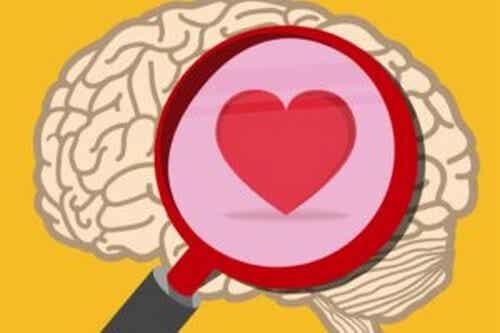
Written and verified by the psychologist GetPersonalGrowth.
Last update: 15 November 2021
When emotions overwhelm us, let's stop and take a deep breath. We will all have experienced this feeling during an argument or when anxiety, always alert and lurking, takes control of a situation and makes us prisoners. These emotional abductions are devastating; however, we always have useful tools at our fingertips to avoid losing control.
There are those who are most vulnerable to emotional floods; while others have an iron self-control thanks to which they manage one by one each of these "Emotional threats". Like someone who forcibly swallows a piece of food without first chewing it. However, neither strategy usually produces the best results when emotions overwhelm us.
The imprint of these complex emotional universes will remain there, on the surface, stealing our calm and balance. Thus, it is common in clinical practice to assist patients who complain of the same things: "I have a terrible anxiety problem", "I do not know what to do with my anger, it overwhelms me", "I can manage my emotions, not I know what to do so that they let me live ”.
These statements show us once again the inclination that the general population shows on this subject. We continue to think of emotions as something negative, than to feel anguish has no purpose, that life itself without the shadow of fear would be a more sensible life. We forget, perhaps, that these dimensions always have a clear purpose for our subsistence and our adaptation.
Knowing, accepting and managing emotions, without running away from them or denying them, will prevent us from these recurring emotional floods.
When emotions overwhelm us, we look to the horizon
When emotions overwhelm us, we need to look for the horizon line and focus on it for a moment. Let the world flow with its sounds, let the discussion about work take its course. We let this stimulus that frightens us remain frozen in time, captured in a harmless dimension. We fix our gaze on this imaginary line of peace and allow our body a few seconds, during which to regulate breathing, heartbeat, tension.
When chaos reigns, the best balm is always calm. This is because when the human being experiences an emotional flood, to support the panic mechanism is the most instinctive part of our brain; and, in these moments, everything is chaotic, disordered and intense. To the point that the prefrontal cortex, where our capacity for analysis, decision making and logical reasoning are orchestrated, remains "disconnected".
The amygdala and the direct journey to fear or anger
When emotions overwhelm us, we can go from calm to panic, anger or fear in just five seconds. How is it possible? What inner mechanism is capable of taking over in such a way? We'll all have asked ourselves this question sometime, and the answer couldn't be more fascinating, and at the same time disturbing: it all depends on the amygdala.
As a study conducted by Emory University, Atlanta, and published in the journal Biological Psychiatry reveals, the amygdala modulates our behavior associated with fear, stress or aggression. It has been shown that this small facility collects information from the surrounding environment, in relation to the threats that surround us (real or not); and it always makes us react with a concrete goal: to survive.
Unregulated emotions, emotions that take over
People who develop an emotional disorder cannot or cannot regulate their emotions. Over time, this situation generates greater anguish, to the point of giving shape to a kind of helplessness where everything is beyond our control. Therefore, we must be clear that emotions that we do not regulate today will overwhelm us tomorrow, and if this situation becomes chronic, certain conditions may appear, such as generalized anxiety and depression.
Another aspect to consider is that in these situations it is useless to suppress emotions or block thoughts. The classic idea of "I will not think about this, or rather I repress this anger or this anger", far from helping us, can generate more blocks or problems in us in the short and long term.
What to do when emotions overwhelm us?
What is the best strategy when emotions overwhelm us? Often, in any psychological context, we make use of the word "emotional control". Well, instead of "control" it would be more appropriate to make use of the term "regulation", for the flexibility and dynamism that this word transmits to us.
Somehow, those in control tend to include a mix of strength and dominance in this action. In this case, e in the emotional sphere, it is preferable to abandon resistance and opt for acceptance, management, flexibility, transformation and movement.
So let's see what strategies we should apply in these cases.
- A study published in the journal Frontiers in Psychology points out that emotional regulation doesn't have one size fits all. In other words, there is no single strategy that we need for every situation and circumstance. The anxiety of facing an exam, an argument, having to accept a breakup or even a loss, will cause you to have to put into practice strategies to cope with the situation.
- On the other hand, emotions always exist for a purpose and we must ask ourselves what they expect or want from us. Consequently, looking up to the horizon is always a useful strategy in the face of a state of alarm, to enter our mental "palace" and meet with ourselves. Once here, we have to ask ourselves what is happening and why.
- The cerebral amygdala is a sentinel who, in most cases, decides to mobilize fear or anger. It acts by instinct and not by logic. When it does, it takes control of our body and triggers all the symptoms we already know: tachycardia, nausea, sweating, etc.
When emotions overwhelm us, it is of little use to say to ourselves "calm down, nothing is happening". Because for our organism and our brain it is happening. In these moments the most adequate thing to do is to calm our body through deep breathing. Breathe in deeply and exhale will help us regulate heart rate, relax muscle tension… And, when the body has regained balance, we can knock on the door of our mind and converse with it.


























